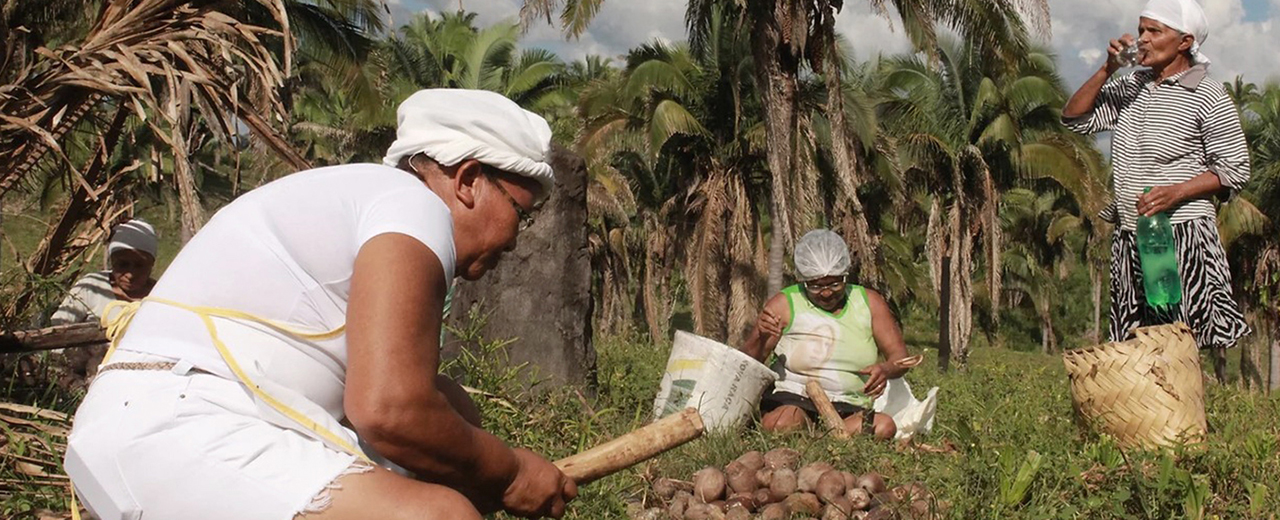 Gathering economy protects the Amazon
Gathering economy protects the Amazon
Empowering Babaçu nutcrackers through cooperatives
In the small settlement of Bairro Novo in the Brazilian Amazon, a very special moment is about to happen. The women of MIQCB, the Association of Babaçu Nutcrackers, are installing an electric oil press in their small warehouse. This will enable them to considerably increase the amount of soap, oil and babaçu flour they produce. The gathering economy based on the babaçu nut is the most important source of livelihood for the families. In mostly smaller groups, the women go into the forest to collect the nuts. Together they then carry their baskets filled with nuts and palm fronds to their production sites, where they crack the nuts and use the oil to make various edible, but mainly skin care products. Selling these provides the women with a small income of their own.
Necessity
Training and networking Babaçu nutcrackers in the Amazon in Brazil
Activity
The NGO MIQCB organises the training of the nutcrackers and helps the women to collectively organise against land grabbing in the Amazon
Countable effort
Number of women who have successfully completed a training course and number of women's cooperatives that have been established
Result
Within a year, 465 women are expected to have successfully completed the training and know how to produce and market which products. Their presence in the rainforest will result in less illegal logging
Systemic effect
The living situation of the women has improved. More Babaçu groves in the rainforest are protected and managed sustainably
Background
The Movimento Interestadual das Quebradeiras de Coco Babaçu (MIQCB) is a women’s movement in the Brazilian Amazon that campaigns for free access to the Babaçu palms. MIQCB organises around 300,000 women working in the collection economy in four states. Their goal is to preserve the babaçu groves as a natural source of livelihood and to oppose the destruction of the forests. Through their work, the women are present in the forests and thus make it more difficult for illegal loggers to clear them.
Across the Amazon there is extensive illegal land grabbing. Since the election of President Bolsonaro in 2018, the raids have increased. Groves of the Babaçu palm, which were freely accessible for decades, are being declared as private property. The palm is part of the natural vegetation of the rainforest, is self-seeding and grows everywhere, given favourable conditions.
The nuts of the Babaçu palms are traditionally collected by women in communal work and brought to the villages. The oil obtained from the kernels of the nuts is extracted and used for cooking, similar to olive oil. Refined, it is also sold to the cosmetics industry as a scent carrier. Soap bars are produced locally. The products derived from the palm tree are used by the women to ensure their survival. But it is not yet enough to sustainably improve their living situation. Buying school books for the children, buying necessary medicines or repairing their houses – all this is only possible if the women regularly earn a small income. That is why the MIQCB cooperatives offer them training. They learn how to better process the nuts and market them in more diverse ways. At the same time, the women get organised in their community, campaign for the preservation of their babaçu groves and learn skills to set up a cooperative.
The good deed
With your good deed today, you will help a Babaçu nutcracker to successfully complete her training. On each day of the training, the women receive instructional material with illustrations, explanations, exercises and instructions. The training lasts 12 days, with workshops, exercises and classes. Once they have completed the training, the women know how to make the various products from the Babaçu palm. They also learn how to market and sell them, e.g. oil and soap. They are also shown how best to organise themselves to improve yields, but also to stand up for their rights politically. As a result, the women bring their skills to a new cooperative and can generate a higher income for their families. This improves the situation of the whole family, children receive school supplies and there is enough food for everyone. The community is strengthened and the forest is also protected and preserved through sustainable use.

About Brazil
Brasília
Capital
213,993,441
Number of inhabitants
7,518.8
Gross domestic product per capita per year
Rang 87 von 191
Human Development Index
The Babaçu palm in Brazil can reach a height of 20 metres and new leaves up to 8 metres long. One palm can produce up to 2,000 nuts per year over a short period of time.
About the organization and further information
Association
Aktionsgemeinschaft Solidarische Welt e.V.
Website


Further information and source
- Bähr, Julia, 29.09.2015. Kampf um die Kokosnuss, Frankfurter Allgemeine Zeitung GmbH
- Bartaburu, Xavier, 27.01.2018. Quebradeiras de coco babaçu, Repórter Brasil, o.O..
- De Oliveira, Nielmar, 15.12.2017. IBGE: 50 milhões de brasileiros vivem na linha de pobreza, Agência Brasil, Rio de Janeiro.
- Fix, Claudia / Ganter, Julia, 05.2021. Brasilien: Der Hunger ist zurück. Ernährungsunsicherheit wächst aufgrund von Corona-Pandemie und verfehlter Regierungspolitik, Lateinamerika Nachrichten, o.O..
- MIQCB – Movimento Interestadual de Quebradeiras de Coco Babaçu, o.J.. Sobre Nós, o.V., o.O..




